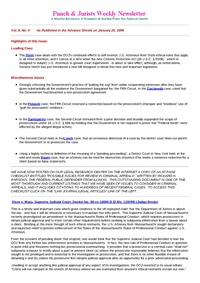Here, based on the Supreme Court's ruling in Salinas, the 2nd Circuit sharply retreated from its prior precedent and held that the Government is not required to prove that "Federal funds" were affected by the alleged illegal activity.
This decision represents another milestone in the creeping efforts of …
This case, which attracted a large collection of amici curiae briefs, involved the dismissal of criminal contempt charges against two Roman Catholic clergymen for violating an injunction issued in connection with their anti- abortion activities. It is noted for its review of the history and purposes of the Criminal …
This is a case that is filled with intrigue. Defendant Harvey Baum, a criminal defense attorney, was charged with obstruction of justice under 18 U.S.C. § 1503, for attempting to set up a fraudulent plan to reduce the sentence of a cooperating witness ("CW"), who was serving 20 years …
Here the Court held that the crime of felon in possession of a firearm is not a "crime of violence" for purposes of determining whether the defendant may be denied bail under the Bail Reform Act.
Case held that when a defendant substantially complies with the terms of his plea agreement, the Government overreaches when it deprives him of the benefits of the bargain by then prosecuting him for the crimes for which he was offered immunity.
This case is another example of vintage …
In this case the Court rejected the defendant's contention that the district court erred in failing to give his theory of defense instruction. It wrote: "A defendant is entitled to an instruction presenting his theory of the defense if the proposed instruction meets four conditions: 1) it is a …
This is a case that is filled with intrigue. Defendant Harvey Baum, a criminal defense attorney, was charged with obstruction of justice under 18 U.S.C. § 1503, for attempting to set up a fraudulent plan to reduce the sentence of a cooperating witness ("CW"), who was serving 20 years …
Although the holding in this case may be somewhat limited by virtue of the fact-specific set of circumstances on which it is based, it is noted because of its strong denunciation of the use of "guilt by association" evidence, another favorite prosecutorial strong-arm tactic which, we submit, has become …
QUOTE OF THE WEEK - The Chronicles of Criminal Injustices: Chapter 756 - "Pulling the Rug"
"It ill behooves government agents and prosecutors to enter into agreements of transactional immunity with mid-level co-conspirators, milk them of substantial leads and information that literally make the government's case against the ‘big …
Although the holding in this case may be somewhat limited by virtue of the fact-specific set of circumstances on which it is based, it is noted because of its strong denunciation of the use of "guilt by association" evidence, another favorite prosecutorial strong-arm tactic which, we submit, has become …
Here the court rejected the defendant's arguments that the Government had failed to prove the necessity for the wiretaps, largely concluding that the defendant's objections were nothing more than general statements and blanket arguments.
The Court did, however, rule that "the Government must seek subsequent authorization to add …
In his dissent from the majority's ruling that the Double Jeopardy Clause barred a retrial of two abortion protestors, Judge Feinberg equated the court's action to judicial nullification which he strongly criticized.
Set forth below is the full text of Judge Feinberg's discussion of The Prerogative of Leniency:
…
In this case the district court ordered that the defendant's new three-year term of supervised release run consecutively to a prior three-year term of supervised release that had been imposed for an earlier conviction. The Fifth Circuit held that was reversible error since the statute (18 USC §3624(e) "unambiguously …
In this case one of the defendants maintained that while he bought, consumed and sold cocaine, he had no agreement with the other members of the conspiracy to distribute what they sold him. The Court observed that "If he is correct, his conviction must be reversed, because, as we …
This is a timely and important case which gives credence to the oft-repeated claim that the Department of Justice is above the law - and that it will do whatever is necessary to maintain that lofty perch. The Supreme Judicial Court of Massachusetts recently promulgated an amendment to the …
